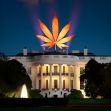On the front page of the Florida Health Office of Medical Marijuana Use website, you'll find the following statement centered on the page in bold lettering: "Medical marijuana is available in Florida, however, remains illegal under federal law."
One Floridian and U.S. Army vet is hoping to change that
Jose Belen is a former U.S. Army service member who served a 14-month deployment to Iraq and Afghanistan. That was over ten years ago, but he still suffers from post-traumatic stress disorder (PTSD) and the disastrous effects it has had on his life stateside. None of the medications he was prescribed seemed to help, and some made things much worse.
Fortunately, Belen found that cannabis could ease his suffering. Unfortunately, the VA can't prescribe marijuana because it is an illegal drug under federal law. Not only is it illegal, it is classified a Schedule I controlled substance, meaning it has "no accepted medical use" and a "high potential for abuse." These claims, however, have been refuted in scientific literature, some of it flowing from the federal government itself. Twenty-nine states have legalized marijuana in one form or another, and 28 of those states, including Florida, include PTSD in their medical marijuana programs.
Belen is suing the federal government, arguing that the government's classification of marijuana as a Schedule I drug is unconstitutional, and he isn't alone. Among his co-plaintiffs in the lawsuit are a former NFL defensive end two pediatric patients using medical marijuana to deal with serious health conditions.
The lawsuit was filed in the United States District Court for the Southern District of New York. The suit names as defendants the Department of Justice, Attorney General Jeff Sessions, the Drug Enforcement Agency, and DEA Director Chuck Rosenberg. A hearing on the government's motion to dismiss the complaint was held in February 2018. The judge in that hearing clearly questioned the classification of marijuana as a Schedule I drug, referring to the plaintiffs in the case as "living proof of the medical applications of marijuana." Still, the judge struggled with the question of whether the courts were the proper place to challenge the classification, as opposed to the regulatory agencies responsible in charge of the listing.
Florida: Late to Medical Marijuana and Still Lagging
Meanwhile, Belen has applied for a Florida medical marijuana certificate. He is currently awaiting certification along with 26,000 other Floridians. Amendment 2 legalized medical marijuana in Florida in 2016 in certain forms and for a limited number of uses with physician approval. Medical marijuana was first legalized in California in 1996, and at least one state has legalized cannabis ever since then in all but seven of the last 22 years. Florida and four other states were the most recent to authorize medical marijuana in 2016. That same year another five states legalized pot for recreational purposes, bringing that total up to nine states plus Washington DC.






